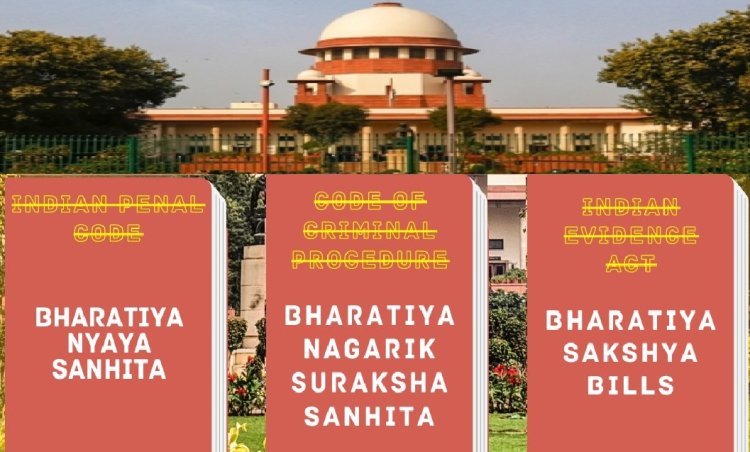Shifts in Criminal Law Dynamics in Modern India
on July 1st 2023, by amending three fundamental laws namely the Indian Penal Code, 1860 (hereinafter ‘IPC’), the Code of Criminal Procedure, 1973 (for brevity ‘CrPC’), and the Indian Evidence Act,1872 (in short ‘IEA’) India has entered into a new era of its criminal justice system. As opinionated by the Home Ministry in several statements, Bharatiya Nyaya Sanhita, 2023 (hereinafter ‘BNS’), Bharatiya Nagarik Suraksha Sanhita, 2023(‘BNSS’ in short), and Bharatiya Sakshya Adhiniyam, 2023 (for brevity ‘BSA’) are three new laws that seek to modernize the criminal justice system, fix current issues, and expedite legal procedures.

Written & Researched by MD FAIZAN ANSARI (Ex-student of Campus Law Centre, Delhi University, Pursuing LL.M from Central University of South Bihar)
INTRODUCTION:
“The new three criminal laws are the watershed moment for our society, because no law
affects the day-to-day conduct of our society like criminal law. Criminal laws direct the moral
arch of the Nation and has the ability of depriving people of their cherished liberties as
well.” – Hon’ble Mr. Dr. DY Chandrachud (former CJI)
The legal landscape of India, particularly with regard to criminal laws, has seen significant
transformation in recent years. Legal experts, decision-makers, and the general public have all engaged in extensive debates and discussions as a result of these changes. In this study, we will discuss and examine the intended benefits and drawbacks of these Criminal laws, which overhauls India's colonial-era criminal laws, (however, Students of Law fail to understand as to why 1973 Criminal Procedure Code, introduced post independence was replaced with BNSS, 2023) marking the beginning of a revolutionary path. Through successful resolution of the complex issues and alignment with the core principles of Indian culture, this new law seeks to transform the legal landscape. Along with eliminating the controversial sedition statute, which has frequently been used to suppress dissent and violate civil freedoms, the amendments especially target major crimes including organized crime, terrorism, corruption and mob lynching. By doing this, these laws uphold the dedication to defending democratic values and guaranteeing the impartial and open administration of justice.
The new legal framework improves the efficacy and efficiency of the justice system by integrating cutting-edge technologies. The law gives victims of crime extensive compensation and rehabilitation programs, emphasizing the importance of victim assistance.
It is especially concerned with protecting and empowering women and children, acknowledging their vulnerabilities, and making sure that the legal system upholds their rights.
| BASIS | OLD CRIMINAL LAWS |
NEW CRIMINAL LAWS |
| Laws and Philosophy | The laws were Indian Penal Code, Code of Criminal Procedure, Indian Evidence Act. The philosophy was to provide punitive and retributive justice. |
The laws are Bharatiya |
| Contentions | Developed by Britishers under British oversight and ideology |
Introduced for the Modern India, with focus on ever dynamic legal landscape. |
| Sentencing | There were fixed punishments and penalties specified for various kinds of crimes. |
There are provisions for |
| Admissibility of Evidence | The acts provided strict and rigid rules for testimonies of witness and sometimes relied upon unreliable circumstantial evidence. Electronic evidence had limited admissibility. |
Scope of admissibility wasexpanded to take into account digital evidence and records and to strengthen investigations. |
|
Trial Procedures |
Tiring, cumbersome and lengthy procedures due to which people experience unnecessay delays and backlogs in courts |
Aimed at expediting the trial process by implementing time limit and leverage technology to enhance efficiency. |
These three criminal laws have seen some key changes:
1. The Bharatiya Nyaya Sanhita, 2023: IPC has been superseded by the BNS, an attempt to reinterpret and reroute the legislation. This law seeks to adopt a nuanced approach to offenses by penalizing actions that endanger India's sovereignty, unity, and integrity through section additions, repeals, and amendments. By distinguishing between serious and small transgressions and applying severe penalties for serious offenses, it also addresses issues like organized crime and terrorism. The concept of "community service" as a criminal consequence is currently being applied by law, which emphasizes a more restorative approach to justice. The BNS that have affected some aspects of our legal order include the following changes.
a) Expanded Rights for Women – There are now additional clauses on women's empowerment in the BNS. As mentioned, the Act has changed the laws for the benefit of women in addition to bringing about change in many other areas.
This includes measures that aim to improve women's standing in the workforce and in society, as well as consequences that would see those who have violated women's rights face harsh punishment in connection with crimes against women. These envision the creation of modifications to put women's safety and rights into perspective. The victim's age as the major would increase from 16 to 18 years old if the incident was gang rape.
b) Laws pertaining to cybersecurity have been strengthened – In order to protect individuals and corporate entities from cyber dangers, The BNS has established stringent legal grounds pertaining to cybersecurity in response to a sharp rise in cybercrime over the years. In an effort to provide a safe online environment for all residents, the following laws are some of the most current ones that establish stringent guidelines for data privacy, cybersecurity, and eprivacy in addition to the right against cybercrime. The government's need to safeguard the nation's digital infrastructure is the reason for the emphasis on cybersecurity.
c) Simplified Court Procedure – The endeavours to ensure that everyone receives justice in a timely manner is the most obvious shift in BNS. This indicates that the proposed reforms are intended to solve problems like court overcrowding, speed up court proceedings and trials, and guarantee that everyone receives equal justice. The legal endeavours aim to administer justice much more efficiently by operationalizing the reduction of judicial duration and simplification. Anyone found guilty of committing or attempting to commit a CLASS-A which Applied Criminology organized crime and dying in the process faces a minimum fine of Rupees ten lakh and a maximum sentence of execution or life in prison.
d) Focus on Protecting the Environment – Understanding the value of protecting the environment, BNS aims to change some parts of the law. The main goals of these modifications are to promote environmentally friendly behaviours, address environmental violations, and establish civil accountability for environmental harm. By prioritizing the environmental cause, the legislative framework aims to protect natural resources and create a more environmentally friendly future for coming generations.
2. Aiming at making justice more accessible and responsive to the demands of the public by establishing deadlines for investigations;
The Bharatiya Nagrik Suraksha Sanhita, 2023 has introduced the followings:
a) Enhanced Monitoring Measures – The new law strengthens national security by using enhanced monitoring measures which include, CCTV cameras must be installed in public areas, and facial recognition software must be used more often for identification.
b) Strengthened Cybersecurity Provisions – Requirement that companies follow strict cybersecurity guidelines which are to creation of a rapid reaction team and to quickly handle cyberattacks and stiffer sanctions for cybercrimes and data breaches.
c) Law Enforcement Agencies’ Empowerment – Allowance for searches without a warrant in high-risk circumstances. Permission to intercept electronic communications where there is a threat to national security. For offenses involving a minimum sentence of seven years in prison, forensic
investigations are necessary. Improved agency-to-agency collaboration for smooth information exchange.
d) Metropolitan Magistrates and metropolitan regions are no longer designated.
e) Effective & expeditious trial: As the Bombay High Court, in the case of Nirmala Bhavesh Parmar vs State of Maharashtra, 2024 was informed that the Maharashtra government has issued a circular instructing all the police officers across the State to 'scrupulously' implement the provisions of the newly enforced Bharatiya Nagarik Suraksha Sanhita (BNSS), which mandate the investigating officer to update the progress of the probe to the complainant, within 90 days of the registration of the First Information Report (FIR).
f) Widening the Discretion of Criminal Court: In the case of Smt. Parisha Trivedi & Anr. Vs State of Chhattisgarh, 2024, The Chhattisgarh High Court recently pointed that Section 482 of Bhartiya Nagrik Suraksha Sanhita, 2023 (BNSS) has widened the discretion conferred upon a criminal court wile deciding the anticipatory bail plea of a person apprehending arrest.
Justice Goutam Bhaduri highlighted that the legislature has deleted the "guiding factors",contained in the erstwhile CrPC, from the corresponding anticipatory bail provision in BNSS.
The Bharatiya Sakshya Adhiniyam, 2023 majorly has seen the modification in including statements recorded electronically.
CONCLUSION
The goal of the New Criminal Laws is to facilitate a swift and effective criminal justice system, presenting both opportunities and obstacles. Only when law enforcement organizations break away from the previous system can the shift to more modern rules that are responsive to current technological advancements be successful and efficient. There will actually be a shift from creating rules for the rulers to creating laws for the governed.
India's constantly changing criminal laws provide a sufficient example of the dynamics that must be taken into account when a piece of legal machinery adjusts to its environment. As much as the new laws represent systemic changes for the struggling Nation Type Fraud, they are still difficult to enact and enforce effectively. These rules must be created in a way that protects the rights of everyone, black or white, from anywhere in the world, and provides justice to those who are less fortunate.
To establish a legal system that not only protects society from criminal dangers but also upholds the principles of justice and fairness in a democratic society, the new criminal laws in India must be carefully examined. The necessity of coordinating rehabilitation and responsibility in response to juvenile offenders is revealed by an examination of juvenile justice reforms. Although the new laws have taken action to promote juvenile change, they are not without problems of their own.










